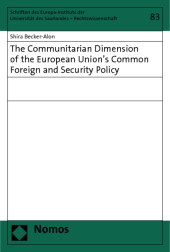The Communitarian Dimension of the European Union's Common Foreign and Security Policy
| Verlag | Nomos |
| Auflage | 2011 |
| Seiten | 312 |
| Format | 22,7 cm |
| Gewicht | 474 g |
| Artikeltyp | Englisches Buch |
| Reihe | Schriften des Europa-Instituts der Universität des Saarlandes - Rechtswissenschaft 83 |
| ISBN-10 | 3832960260 |
| EAN | 9783832960261 |
| Bestell-Nr | 83296026M |
Die Autorin untersucht die Beteiligung und Mitwirkung der Europäischen Gemeinschaft an der Gemeinsamen Außen- und Sicherheitspolitik. Nach der ursprünglichen Regelungsintention sollte die zwischenstaatliche Kooperation in der GASP eigentlich vor dem Einfluss der supranationalen EG abgeschirmt werden, die Untersuchung macht aber deutlich, dass sich inzwischen ein unvermeidliches Zusammenspiel zwischen den beiden Rechtsrahmen entwickelt hat.
Die Arbeit analysiert verschiedene Aspekte und Konsequenzen des Beitrages der EG zur GASP, sowohl in politischer als auch in praktischer Hinsicht. Dabei erläutert die Autorin auch den säulenübergreifenden Ansatz bei der Durchführung der europäischen Außenpolitik.
Die Studie berücksichtigt bereits die gravierenden Rechtsänderungen durch den EU-Reformvertrag und die Auswirkungen auf die GASP. Die Autorin zeigt, dass die Säulenstruktur der Union im Vertrag von Lissabon nicht ganz überwunden wurde.
An examination of the European Community's (EC) involvement within the framework of the Common Foreign and Security Policy (CFSP), whereby, the inevitable interaction between these two frameworks is exposed, despite the initial intention to shield the intergovernmental CFSP from the influence of the supranational EC to the greatest extent possible.The work examines different aspects and consequences of the EC's contribution to the CFSP, both in policy-defining and in practical terms. The growing EC dimension of CFSP indicates a dominant cross-pillar approach in the conduct of European foreign policy. This was essential to allow for the efficient implementation of the CFSP and enhanced the influence of the EC and its institutions. Nonetheless, this support for the CFSP seemed at times to compromise the independence of the EC.Despite the acknowledgement of its advantages, the cross-pillar approach is not necessarily reflected in the Lisbon Treaty. As the examination of the Lisbon Tr eaty continues, the pillar structure is not entirely overcome.

